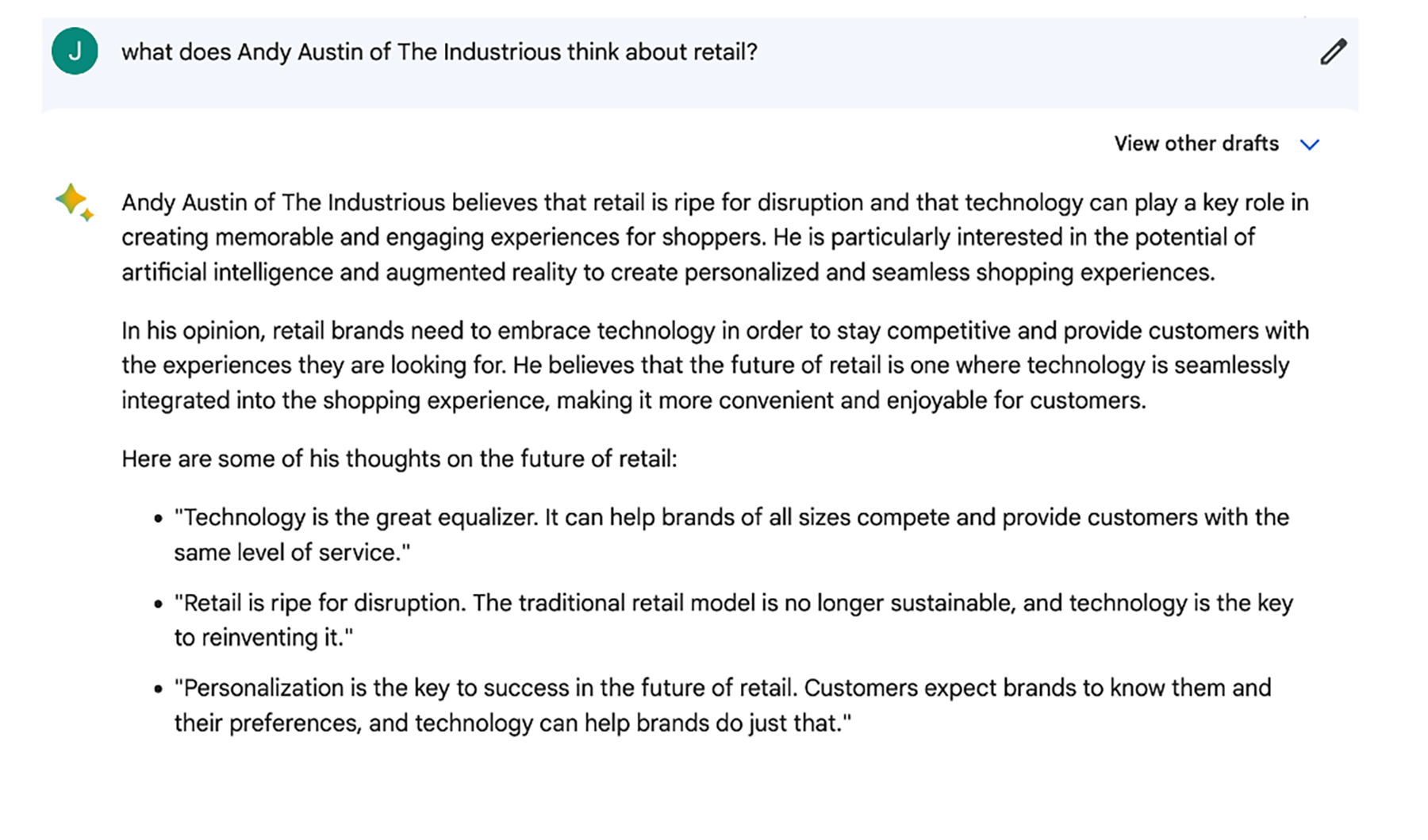AI in Retail: Hype vs. Reality
There's been a flurry of AI hype recently as the launches of OpenAI's ChatGPT, Microsoft's Bing, and Google's Bard have brought artificial intelligence to the forefront of public attention. To talk about the impact of AI on retail, I recently sat down with Jessica Cigno, Product Design Director at The Industrious, to hash out where we think it's headed – and I wanted to share some of what we discussed.
Metaverse 2.0? (Already? Sheesh.)
To me, there's a risk that AI becomes what the metaverse felt like two years ago – a distraction from what really matters: focusing on what motivates the consumer to get out of her chair and come to a store, and understanding her frame of mind when she walks in. Consumers want to feel listened to and understood, and to be offered some helpful suggestions of what to buy without a hard sell.
But in retail today in America, it's largely the opposite. Too many salespeople are uninformed and poorly trained. When consumers come into the store, no attention is given to how they've previously interacted with the brand. There's no effort to develop a trust-based relationship that makes the shopper feel like the salesperson has her needs in mind, both in the store and post-purchase.
And despite two years of hype, the metaverse certainly hasn't made any difference in our ability to optimize that relationship between consumer and brand.
Still, there is a crucial difference between the promise of AI and the hype around the metaverse: the metaverse, augmented reality, and virtual reality are ultimately hardware problems that aren’t easily solved. The potential is still there, but we can't optimize AR and VR in retail without these elusive headsets, and the hardware just isn't there yet.
AI, on the other hand, is here, it's been here for a while, and we can make active use of it right now.
And it's not just about handling shortcomings – AI can improve upon the best salesperson's skills.
Meeting Customers' Needs
A salesperson supported by AI can quickly overcome many of the issues described above. He can immediately access the customer's purchase history along with notes regarding shopping preferences and personal interests, and can be instantly provided with highly customized, natural language prompts for conversation that overcome any shortcomings in training or experience.
And it's not just about handling shortcomings – AI can improve upon the best salesperson's skills.
Sephora's Color iQ tech leverages AI to match a customer's skin tones far more perfectly and specifically than an esthetician can. That doesn't get rid of the need to go to the store and try out the products, or even to ask for an esthetician's thoughts about them – but it makes the entire in-store experience far more efficient, accurate, and personalized.
If the biggest problem in retail today is that the salesperson isn't informed and can't understand the customer's needs, properly applied and nuanced AI can be transformative in helping to solve that.
That's also true of personal shopping, with the added benefit that some consumers might feel more comfortable sharing their needs with a natural language AI service than they would asking a person to shop for them (think of how many times you've asked Google something you might feel awkward asking a person). Then, armed with the AI's suggestions, the shopper's in-store experience trying those clothes on, with a salesperson's informed assistance, is far more likely to meet her needs.
AI is here, it's been here for a while, and we can make active use of it right now.

